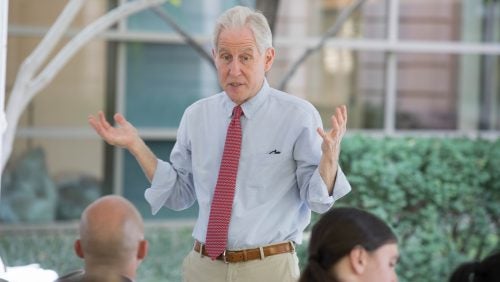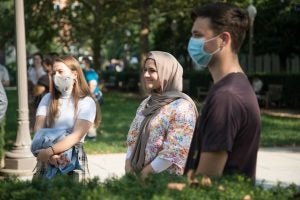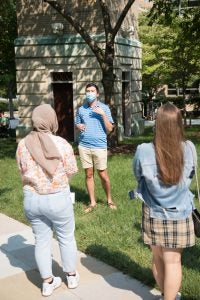Georgetown Law Admissions Team Hosts Information Sessions — In Person and Online
September 20, 2021

Dean of Admissions Andrew Cornblatt speaks to prospective students at an on-campus information session.
Recently, on a warm September afternoon, 31 aspiring lawyers gathered under a large white tent on Georgetown Law’s Eleanor Holmes Norton Green.
Perhaps a year from now, a few of them will be among the students constantly criss-crossing between classrooms, the library and the cafeteria. For now, they are all just beginning the admissions process.
The COVID-19 pandemic continues to restrict the admissions staff’s ability to travel around the country and hold information sessions and interviews. So this year, they’re using Zoom and the tent to connect with applicants in a series of online and on-campus events.

Prospective applicants on a tour.
The Law Center’s longtime dean of admissions, Andrew Cornblatt, opened his first in-person admissions presentation in nearly two years with a hearty “Welcome to history!”
In the most recent cycle, applications flooded in to Georgetown Law — 41% more than in the previous year. Cornblatt said that when faced with such a volume, one might assume he and his colleagues would rely more than ever on numbers like LSAT scores and college transcripts to make their picks. However, he said, in fact they focused intently on the personal details in the dossiers, in an effort to get to know each applicant as an individual.
“It’s as if I went on 14,000 blind dates!” he said. “I read every file. Every. One.”
He said that the spike in application numbers wasn’t surprising, given that it increasingly seems that law is at the center of every story in the headlines. Cornblatt praised the visitors before him for wanting to get involved.
“We need ethical, energetic, committed lawyers,” he said. “Good for you!”
APPLICATION TIPS
Over the course of half an hour, Cornblatt shared invaluable tips on how to approach the law school application process. Test scores and GPAs are, of course, important, he said, but at the same time, applicants should keep in mind that a “median” score is not a cut-off: half of admitted students’ numbers fall below the median.
Essays, recommendation letters, work history and other supplementary materials, meanwhile, give the admissions team a better sense of why an applicant wants to study law, and why they believe Georgetown would be the best place for them to do so. Cornblatt recommended that applicants keep their personal essays brief, engaging and, well, personal.
His other main piece of advice was not to delay in submitting applications. Some 400 applications have already come in, he said, and he would begin his first round of admissions decisions in mid-October.
A STUDENT’S GUIDE TO LIFE

Student ambassador Mason Eiss L’24 gives a tour around campus.
Following Cornblatt’s remarks, the audience split up into six smaller groups to tour campus and hear about student life from one of the student “ambassadors” who work with the admissions office.
With pandemic protocols in place, the tours stayed outdoors, but 1L student Mason Eiss ably explained what went on inside each building, describing professors’ offices, the fitness center, lecture halls and library study rooms. His apartment in the Gewirz Student Center even has a prime view of the U.S. Capitol dome, he said.
The prospective applicants on the tour peppered Eiss with questions about how he had prepared for the LSAT, what his class schedule is like, how students balance their academics with activities, jobs and internships, whether students have access to on-campus parking and whether he already had a job lined up for the summer. Eiss, a Florida native interested in a career in public law, answered each one candidly and cheerfully.
Although he had arrived on campus only a few weeks earlier, Eiss said he already felt at home at Georgetown Law. The way each first-year class is subdivided into sections helped him quickly get to know the other students in his classes, but at the same time, he has access to large-school resources like a full array of clubs and organizations and a career services office that focuses exclusively on public interest jobs and internships.
With excitement in his voice, he shared that one of his professors will soon argue a case before the Supreme Court — and had promised that it won’t interfere with class as scheduled.
As the tour ended at the foot of the steps to the Edward Bennett Williams Law Library, Eiss wished the campus visitors good luck on their law school applications, echoing Dean Cornblatt’s advice to treat the essays as opportunities to provide a glimpse of their personality.
“They want to know about the person, not just the numbers,” he said. “Make sure to tell them who you are and what you want to do with your career.”
Georgetown Law Admissions plans to continue offering both on-campus and online information sessions through the fall. Under current Georgetown COVID-19 protocols, on-campus sessions are outdoor only. Click here for the latest information on scheduled information sessions and to register to attend one.